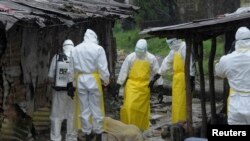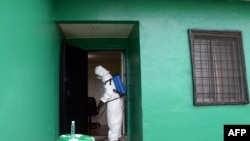Fears of Ebola spread deeper through West Africa Friday, as Senegal announced its first case and the World Health Organization shuttered its laboratory in Sierra Leone after a healthcare worker became infected with the highly contagious virus.
In Guinea, meanwhile, a Red Cross official said riots broke out in the country’s second largest city over rumors that health workers had infected people with the virus.
The World Health Organization has warned that the outbreak was escalating, with 40 percent of the total number of cases occurring in the past 21 days. The disease could eventually infect 20,000 people across the region, the agency said.
The case announced Friday by Senegal’s health minister makes that country the fifth in the region to be hit by the virus, which has killed more than 1,500 people, mostly in Guinea, Liberia and Sierra Leone. Nigeria has also recorded 15 cases and six deaths since it was first reported last month.
The director of the U.S. Centers for Disease Control and Prevention, meanwhile, warned that the outbreak could spread beyond West Africa.
"If we don't stop it here, we're going to be dealing with it for years around the world. But we can still stop it," said Dr. Tom Frieden, during a trip to Liberia on Thursday.
Senegalese Health Minister Awa Marie Coll Seck told reporters that the infected person was a Guinean university student who sought treatment at a hospital in Senegal's capital, Dakar, this week.
The man said he had contact with Ebola patients in Guinea, and that he subsequently tested positive for the virus, she said.
Experts have said a shortage of protective equipment is one of the factors contributing to the epidemic. A Senegalese epidemiologist was flown to Germany earlier this week after contracting the virus from a testing lab in the Sierra Leonean town of Kailahun.
“We’re worried about (healthcare workers’) welfare and health,” WHO spokeswoman Joy Rivica said about the shuttered lab. “We brought them to Freetown and we have a team ready to be deployed to Kailahun, anytime, as soon as we find out how our colleague got infected, the reasons for that. And as soon as it’s ready and that’s possibly next week, WHO will resume full operation in Kailahun.”
In Freetown, residents said fear was growing.
“Very scared, our people are dying, doctors and nurses are dying,” taxi driver Morrison Vandy said.
Rioting in Guinea
In the southern Guinean city of Nzerekore, a crowd of young men, some armed with clubs and pistols, set up barricades Thursday and threatened to attack the hospital, said Youssouf Traore, president of the Guinean Red Cross. Security forces eventually restored order but not before gunshots were fired by rioters and several people were injured.
“A rumor, which was totally false, spread that we had sprayed the market in order to transmit the virus to locals,” Traore said. “People revolted and resorted to violence, prompting soldiers to intervene.”
A government report released Tuesday showed there were 12 suspected, probable and confirmed cases in Nzerekore.
The disease was first reported in southeastern Guinea in March; more than 400 people have died in that country alone, although the rate of infection is reported to be slower than in Liberia and Sierra Leone.
The Guinea government has insisted it has controlled the epidemic but has expressed concern over new cases in the southern regions, which it blames on victims spilling over from neighboring countries.
Nigerians Resist Clinics
In Nigeria, meanwhile, some have pushed back against government plans to build isolation units in their neighborhoods, even saying they would sooner burn Ebola centers down than allow them to operate.
In the northern city of Kaduna, hundreds of people on Wednesday protested plans to convert sections of a local clinic into an Ebola treatment center. Many carried signs that said: "No Ebola in our hospital."
“They are kicking against it, that it should not be situated here. Not that government should not do what it is supposed to do. But situating it here is what they are against," said Danjuma Musa, a religious leader in Down Quarters, where the hospital is located.
Health Minister Onyebuchi Chukwu said Thursday the government should prepare for the possibility of a widespread outbreak. He said “irrational fears” were driving protesters’ opposition to isolation centers.
“Even family members are not even permitted. You’re a man? Your wife is not even permitted. You’re a woman? Your husband, your children, they are not even permitted,” Chukwu said. “So I don’t know how people now think they will get Ebola because we are treating. In any case, people might as well ask all hospitals be removed from their cities.”
Some residents that attended the protest Wednesday said they feared an Ebola center could spark public outrage and more violence in the state, which has been terrorized by the radical Islamist group Boko Haram in recent years.
“When you look at the number of people that came out yesterday protesting, at least that can trigger something else in the state,” said Ibrahim Shehu, who chairs the clinic’s board. “But thank God, we did things peacefully.”
Other residents say Nigerians are so afraid of Ebola in general, that even if the isolation unit has no patients, its presence will keep people out of the neighborhood, killing their businesses.
Abdullahi Mohammed Barnawa, who sells wood at a Kaduna market near the clinic, wrongly believed Ebola was airborne, when in fact it spreads through contact with bodily fluids.
“When there is something dangerous nobody will patronize you. People will run away from you,” Barnawa said.
Officials in Nigeria and elsewhere have tried to dispel rumors with TV ads, radio announcements and educational flyers, warning that false information can sometimes be as deadly as Ebola.
VOA’s Nina deVries in Freetown, Liberia, Heather Murdock in Abuja, Nigeria, Ibrahima Yakubu in Kaduna, Nigeria contributed to this report.












